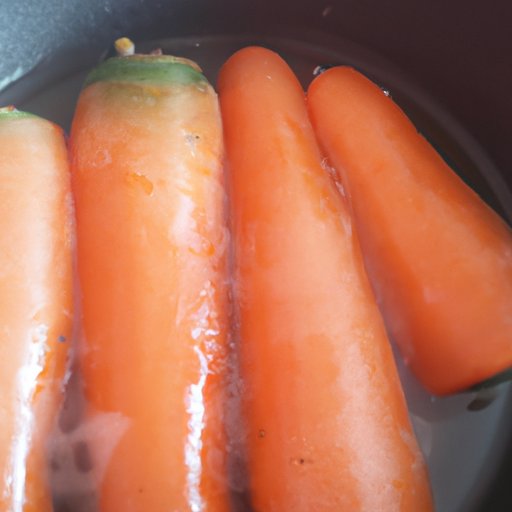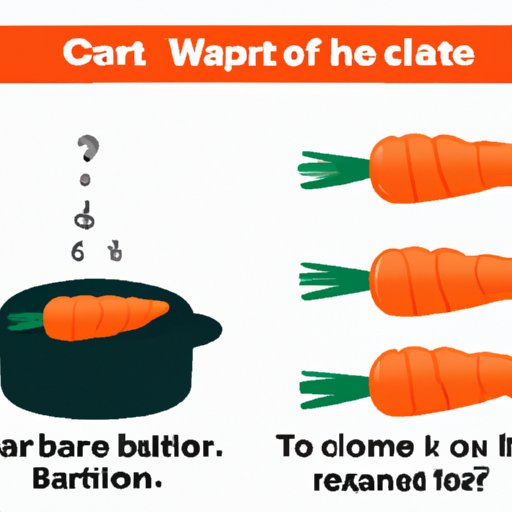
Introduction
Boiling carrots may seem like a simple task, but it can often go awry. Mushy, overcooked carrots or underdone, crunchy carrots can be a common result of a failed boiling attempt. In this article, we’ll cover how to properly boil carrots, including preparation, cooking times, seasoning, storage, and creative recipe ideas. By the end, you’ll have all the knowledge you need to confidently boil carrots to perfection every time.
Step-by-Step Guide on Boiling Carrots for Beginners
Before boiling carrots, there are a few steps you should take to properly prep them. Start by washing and peeling them if desired. Cut the carrots into equal sizes to ensure even cooking, and pat them dry with a kitchen towel.
Next, add the carrots to a pot of boiling water. Make sure the water completely covers the carrots. Reduce the heat to medium and let the carrots boil for 5-10 minutes, depending on their size. For baby carrots, boil for 5-6 minutes, while larger carrots may take up to 10 minutes to cook.
When testing for doneness, use a fork or a toothpick to pierce the carrot. If it slides easily, it’s done. If the carrot is still tough, continue to boil for another minute or two.
Once done, remove the carrots from the pot using tongs or a slotted spoon and let them cool. Serve as is or with a seasoning of your choice.
Health Benefits of Boiled Carrots and How to Make Them
Boiled carrots are a great source of essential vitamins and nutrients such as vitamin A, vitamin K, and potassium. They’re also low in calories and high in fiber, making them a great addition to any healthy diet.
To make boiled carrots more exciting, try seasoning them with butter, honey, garlic, salt, and pepper. You can also experiment with herbs such as thyme, rosemary, and parsley to add a burst of flavor to your boiled carrots.
Boiled carrots have a sweeter taste than raw or roasted carrots, making them perfect for adding to recipes that require a slightly sweet flavor or when you want to contrast savory flavors in a dish.
Tips for Seasoning Boiled Carrots to Enhance Flavor
When it comes to seasoning boiled carrots, the sky is the limit. You can experiment with a variety of seasonings and spices to create unique flavors. Here are a few tips to keep in mind:
- Use fresh herbs and spices for best results.
- Add seasonings during the boiling process for the best absorption of flavors.
- Keep the seasoning balanced so it doesn’t overpower the natural sweetness of the carrots.
Proper Storage of Boiled Carrots for Meal Prep
If you want to make boiled carrots in advance for meal prep, you should first make sure they cool down to room temperature. Once cooled, store them in an airtight container in the fridge for up to 3 days. To reheat, place them in the microwave or oven at 350°F for a few minutes or until fully heated through.
Creative Recipes for Using Boiled Carrots
Boiled carrots can be used in a variety of dishes, from salads to soups to stews. Here are a few creative recipe ideas:
- Add boiled carrots to a salad with cucumbers, feta cheese, and a light lemon dressing for a refreshing summer meal.
- Use boiled carrots in a vegetable stew with potatoes, onions, and your choice of protein.
- Add boiled carrots to your favorite chicken noodle soup recipe for a boost of vitamins and flavor.
To make these recipes more interesting, try variations such as adding cinnamon or ginger to the carrots or roasting them before adding them to the dish.
Comparing the Nutritional Value of Boiled Carrots Versus Raw or Roasted Carrots
Boiling carrots preserves the nutritional value of the vegetable much better than roasting or frying. Although boiling may reduce the vitamin content slightly, it doesn’t cause the same nutrient loss as high heat methods. Raw carrots are also a great source of nutrients, but boiled carrots are easier to digest and release more nutrients during cooking.
While roasting carrots may provide a crispy texture and smoky flavor, it can also cause a loss in nutritional value. Boiling carrots is a healthier option as it preserves the vitamin content of the vegetable and releases nutrients easier for digestion.

Frequently Asked Questions About Boiling Carrots
Here are a few commonly asked questions about boiling carrots:
- Can I boil carrots whole?
- Should I peel the carrots beforehand?
Yes, you can boil whole carrots, but they may take longer to cook.
You don’t have to peel the carrots if you don’t want to, but it’s recommended to wash them thoroughly before boiling them.
Conclusion
Boiling carrots is a simple and easy way to incorporate this nutritious vegetable into your diet. With the help of this step-by-step guide, you’ll be able to boil carrots to perfection every time. Whether you’re a seasoned cook or a beginner in the kitchen, there are plenty of ways to make boiled carrots more interesting by adding seasonings, trying new recipes or eating them alone. So don’t be afraid to experiment and enjoy all the health benefits that boiled carrots have to offer.





